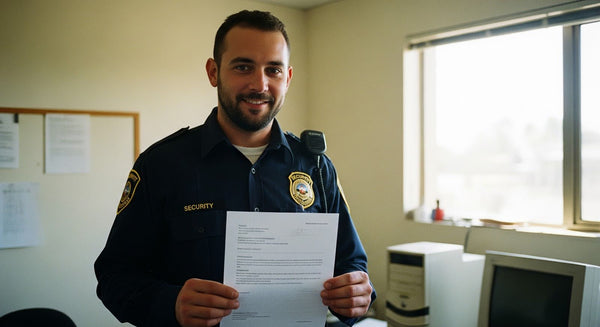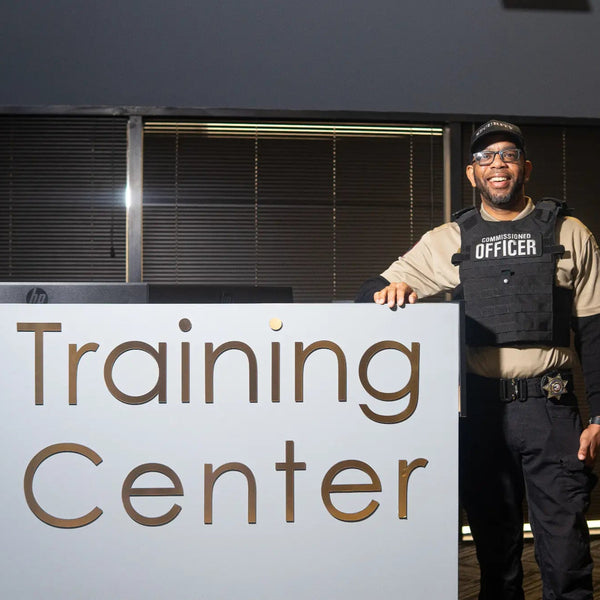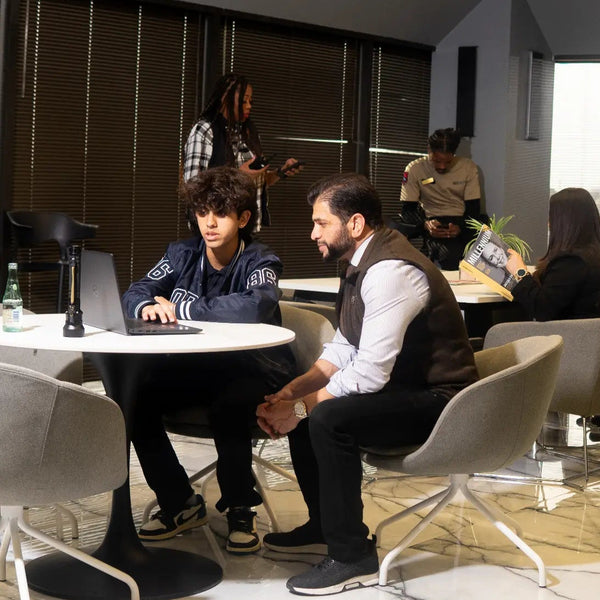Security Guard School was built by industry vets who know what it takes to advance a security career. We've certified over 100,000 guards over the years, and we look forward to helping you on your journey.
Get Started

SECURITY GUARD TRAINING
-
Become Certified
GET CERTIFIED: TEXAS - SECURITY LICENSE – LEVEL 2 COURSE (4 HOURS)
GET CERTIFIED: TEXAS - SECURITY LICENSE – LEVEL 2 COURSE
Regular price $59.00Regular priceUnit price / perCouldn't load pickup availability
-
Become Certified

GET CERTIFIED: GEORGIA - SECURITY CERTIFICATE (24 HOURS)
GET CERTIFIED: GEORGIA - SECURITY CERTIFICATE
Regular price $99.00Regular priceUnit price / perCouldn't load pickup availability
-
Become Certified

GET CERTIFIED: PERC CARD - ILLINOIS SECURITY OFFICER TRAINING (20 HOURS)
GET CERTIFIED: PERC CARD - ILLINOIS SECURITY OFFICER TRAINING
Regular price $99.00Regular priceUnit price / perCouldn't load pickup availability
-
Become Certified

GET CERTIFIED: ARIZONA - DPS NEW UNARMED GUARD CARD COURSE (8 HOURS)
GET CERTIFIED: ARIZONA - DPS NEW UNARMED GUARD CARD COURSE (8 HOURS)
Regular price $59.00Regular priceUnit price / perCouldn't load pickup availability
-
Get Certified

GET CERTIFIED: California - BSIS MANDATORY Continuing Education Bundle (16 Hours)
GET CERTIFIED: California - BSIS MANDATORY Continuing Education Bundle
Regular price $63.99Regular priceUnit price / perCouldn't load pickup availability
-
Become Certified
GET CERTIFIED: DENVER - NEW SECURITY GUARD TRAINING COURSE (16 HOURS)
GET CERTIFIED: DENVER - NEW SECURITY GUARD TRAINING COURSE
Regular price $99.00Regular priceUnit price / perCouldn't load pickup availability
-
Become Certified

GET CERTIFIED: UTAH - SECURITY GUARD LICENSE - ONLINE BASIC SECURITY TRAINING COURSE
GET CERTIFIED: UTAH - SECURITY GUARD LICENSE - ONLINE BASIC SECURITY TRAINING COURSE
Regular price $99.00Regular priceUnit price / perCouldn't load pickup availability
-
Become Certified

GET CERTIFIED: TENNESSEE - SECURITY GUARD LICENSE TRAINING COURSE (4 HOURS)
GET CERTIFIED: TENNESSEE - SECURITY GUARD LICENSE TRAINING COURSE
Regular price $67.00Regular priceUnit price / perCouldn't load pickup availability
-
Become Certified

GET CERTIFIED: MINNESOTA - SECURITY GUARD TRAINING COURSE (12 HOURS)
GET CERTIFIED: MINNESOTA - SECURITY GUARD TRAINING COURSE
Regular price $99.00Regular priceUnit price / perCouldn't load pickup availability
-
Become Certified

GET CERTIFIED: DELAWARE - SECURITY LICENSE TRAINING COURSE (10 HOURS)
GET CERTIFIED: DELAWARE - SECURITY LICENSE TRAINING COURSE
Regular price $99.00Regular priceUnit price / perCouldn't load pickup availability
-
Bundle

Customer Conflict Management
Includes three specialty certifications tailored to your industry, so you can earn more with your expertise
Regular price $89.10Regular priceUnit price / per$148.50Sale price $89.10Couldn't load pickup availability
Sale -
Bundle

Legal Compliance Readiness
Includes three specialty certifications tailored to your industry, so you can earn more with your expertise
Regular price $89.10Regular priceUnit price / per$148.50Sale price $89.10Couldn't load pickup availability
Sale -
Bundle

Legal and Safety Compliance
Includes three specialty certifications tailored to your industry, so you can earn more with your expertise
Regular price $89.10Regular priceUnit price / per$148.50Sale price $89.10Couldn't load pickup availability
Sale -
Bundle

Incident & Threat Response
Includes three specialty certifications tailored to your industry, so you can earn more with your expertise
Regular price $89.10Regular priceUnit price / per$148.50Sale price $89.10Couldn't load pickup availability
Sale -
Bundle

Hospitality Threat Preparedness
Includes three specialty certifications tailored to your industry, so you can earn more with your expertise
Regular price $89.10Regular priceUnit price / per$148.50Sale price $89.10Couldn't load pickup availability
Sale -
Bundle

Health & Emergency Care
Includes three specialty certifications tailored to your industry, so you can earn more with your expertise
Regular price $89.10Regular priceUnit price / per$148.50Sale price $89.10Couldn't load pickup availability
Sale -
Bundle

Guest Relations & Safety
Includes three specialty certifications tailored to your industry, so you can earn more with your expertise
Regular price $89.10Regular priceUnit price / per$148.50Sale price $89.10Couldn't load pickup availability
Sale -
Bundle

Field Interaction Skills
Includes three specialty certifications tailored to your industry, so you can earn more with your expertise
Regular price $89.10Regular priceUnit price / per$148.50Sale price $89.10Couldn't load pickup availability
Sale -
Bundle

Factory Safety & Protocol
Includes three specialty certifications tailored to your industry, so you can earn more with your expertise
Regular price $89.10Regular priceUnit price / per$148.50Sale price $89.10Couldn't load pickup availability
Sale -
Bundle

Essential Professional Skills
Includes three specialty certifications tailored to your industry, so you can earn more with your expertise
Regular price $89.10Regular priceUnit price / per$148.50Sale price $89.10Couldn't load pickup availability
Sale -
Bundle

Emergency Response Ready
Includes three specialty certifications tailored to your industry, so you can earn more with your expertise
Regular price $89.10Regular priceUnit price / per$148.50Sale price $89.10Couldn't load pickup availability
Sale -
Bundle

Logistics Safety Protocol
Includes three specialty certifications tailored to your industry, so you can earn more with your expertise
Regular price $89.10Regular priceUnit price / per$148.50Sale price $89.10Couldn't load pickup availability
Sale -
Bundle

Crowd Management
Includes three specialty certifications tailored to your industry, so you can earn more with your expertise
Regular price $89.10Regular priceUnit price / per$148.50Sale price $89.10Couldn't load pickup availability
Sale -
Bundle

Crisis Management & Ethics
Includes three specialty certifications tailored to your industry, so you can earn more with your expertise
Regular price $89.10Regular priceUnit price / per$148.50Sale price $89.10Couldn't load pickup availability
Sale
Specialty Certifications That Help You Stand Out—And Get Paid More
Earn up to 23% more per hour by upgrading your skillset. Our specialty courses aren’t just extras—they’re career boosters. From defensive driving to de-escalation, each certification is trusted by employers and designed to make you more valuable on the job. Choose your add-ons. Get hired faster. Get paid better.

Defensive Driving Course
SPECIALTY CERT: DEFENSIVE DRIVING – DRIVER AND VEHICLE SAFETY (2 HOURS)
Couldn't load pickup availability

Basic and Emergency First Aid
SPECIALTY CERT: BASIC AND EMERGENCY FIRST AID (2 HOURS)
Couldn't load pickup availability

Communication and Its Importance
SPECIALTY CERT: COMMUNICATION AND ITS IMPORTANCE (4 HOURS)
Couldn't load pickup availability

Crisis Intervention
SPECIALTY CERT: CRISIS INTERVENTION (4 HOURS)
Couldn't load pickup availability

De-escalation of Force
SPECIALTY CERT: DE-ESCALATION OF FORCE
Couldn't load pickup availability

Documentation & Report Writing
SPECIALTY CERT: DOCUMENTATION & REPORT WRITING (4 HOURS)
Couldn't load pickup availability

Fire Safety and Fire Watch Training
SPECIALTY CERT: FIRE SAFETY AND FIRE WATCH TRAINING (1 HOUR)
Couldn't load pickup availability

Security Officer: General Duties
SPECIALTY CERT: GENERAL DUTIES, WRITING REPORTS, & CONDUCTING PATROLS (6 HOURS)
Couldn't load pickup availability

ID Verification Training
SPECIALTY CERT: ID VERIFICATION TRAINING (1 HOUR)
Couldn't load pickup availability

Legal Responsibilities and Use of Force
SPECIALTY CERT: LEGAL RESPONSIBILITIES AND USE OF FORCE (4 HOURS)
Couldn't load pickup availability

Patrol Techniques
SPECIALTY CERT: PATROL TECHNIQUES (2 HOURS)
Couldn't load pickup availability

Professional Conduct, Ethics, & Sexual Harassment
SPECIALTY CERT: PROFESSIONAL CONDUCT, ETHICS, & SEXUAL HARASSMENT (4 HOURS)
Couldn't load pickup availability

Public Relations - Community & Customer
SPECIALTY CERT: PUBLIC RELATIONS - COMMUNITY & CUSTOMER (4 HOURS)
Couldn't load pickup availability

Sexual Harassment and Discrimination
SPECIALTY CERT: SEXUAL HARASSMENT AND DISCRIMINATION (1 HOUR)
Couldn't load pickup availability

Situational Response II
SPECIALTY CERT: SITUATIONAL RESPONSE II (4 HOURS)
Couldn't load pickup availability

Situational Response I
SPECIALTY CERT: SITUATIONAL RESPONSE, RESPONDING TO & DOCUMENTING CRITICAL EVENTS (4 HOURS)
Couldn't load pickup availability
Hear from our certified guards
Deshawn Carter
Hear from Our Graduates: How Our Course Transformed Their Security Careers
Learn MoreBECOME CERTIFIED SECURITY GUARD
Are you ready to start a fulfilling career in the security industry? We are your go-to source for thorough and exceptional security guard training. Security Guard School is committed to giving you the skills and knowledge you need to succeed in this dynamic field.



SEE HOW WE STACK UP
| Features | Security Guard School | ShieldForce Academy | National GuardCert Network | Sentinel Security Institute |
|---|---|---|---|---|
| Fully Online Courses | ✓ Access from phone, tablet, and computer |
Limited | Limited | Limited |
| Nationwide Certification Coverage | ✓ Coast-to-coast compliance |
X | X | X |
| Instant Certificate Download | ✓ Download anytime, anywhere |
X | X | X |
| Specialty Certifications | ✓ Expand your skills + pay |
Limited | Limited | Limited |
| Interactive Online Training | ✓ Modern & mobile-friendly |
X | Limited | X |
| Real Human Support, 24/7 | ✓ Chat, phone & email |
X | Limited | Limited |
| Built by Industry Pros | ✓ Career-focused curriculum |
X | ✓ | X |
| Government-Sponsored Training | ✓ Eligible for state programs |
Limited | X | Limited |
| Trusted by 100K+ Guards | ✓ Proven results |
X | Unknown | Unknown |
FREQUENTLY ASKED QUESTIONS
Get Started
What skills do security guards need?
Security guards require a diverse set of skills to effectively perform their duties and ensure the safety and security of people and property. Here are some essential skills for security guards:
1. Observation Skills: Security guards must be vigilant and observant, constantly scanning their surroundings for any signs of suspicious activity or potential threats.
2. Communication Skills: Effective communication is crucial for security guards to interact with coworkers, clients, and the public. They should be able to communicate clearly and professionally both verbally and in writing.
3. Conflict Resolution: Security guards may encounter conflicts or confrontations in the course of their duties. Having strong conflict resolution skills can help them de-escalate tense situations and resolve disputes peacefully.
4. Physical Fitness and Stamina: Depending on the assignment, security guards may need to stand or patrol for long periods and may need to respond quickly to emergencies. Good physical fitness and stamina are important for performing these tasks effectively.
5. Emergency Response: Security guards should be trained in emergency response procedures, including how to respond to fires, medical emergencies, and other crises. They should remain calm under pressure and take appropriate action to mitigate risks and protect people and property.
6. Security Technology Proficiency: Many security operations rely on technology such as surveillance cameras, access control systems, and alarm systems. Security guards should be familiar with using and troubleshooting these technologies.
7. Attention to Detail: Security guards must pay close attention to detail to detect and report any security breaches, safety hazards, or policy violations. Small details can often provide important clues or indicators of potential threats.
8. Ethical Conduct: Security guards are entrusted with the safety and security of others, so they must adhere to high ethical standards. This includes maintaining confidentiality, respecting the rights of individuals, and following legal and company policies.
9. Teamwork: Security guards often work as part of a team, collaborating with coworkers, law enforcement, and other stakeholders to maintain security. Being able to work effectively with others is essential for achieving common security objectives.
10. Crisis Management: In the event of a security breach or crisis situation, security guards may need to take decisive action to protect people and property. Training in crisis management and decision-making can help them respond effectively in high-pressure situations.
These are just a few examples of the skills that security guards need to excel in their roles. Depending on the specific requirements of their assignments, security guards may need additional skills or specialized training.
What do security guards do?
Security guards enforce rules on a property, and deter criminal activity, either by walking the facility and grounds to conduct security checks, or monitoring surveillance cameras and alarms. The core responsibilities of any officer are OBSERVE and REPORT.
Is the security guard course hard?
No, basic things you learned in school and common sense. Not all basic security is common sense. There is a 6-hour course that is required to take in Texas. The exam is not hard, if you pay attention in class and take note.
How can a security guard identify potential security threats?
By being observant, understanding normal versus abnormal behaviors, and staying informed about current security threats.
What is the importance of a security guard’s patrol?
Providing directions, helping with inquiries, and ensuring a safe environment all contribute to positive customer experiences. Similar to an information center.
How does customer service relate to a security guard’s duties?
Regular patrols help deter crime, ensure safety, and identify security risks or breaches.
What questions are asked in a security interview?
In a security interview, hiring managers typically ask a range of questions to assess candidates' qualifications,
experience, and suitability for the security guard position. Here are some common questions you might encounter in a security interview:
1. Tell me about your previous experience in security or related fields.
2. What motivated you to pursue a career in security?
3. How do you stay vigilant and alert during long shifts?
4. Describe a time when you had to handle a difficult or confrontational situation. How did you handle it?
5. What procedures do you follow to ensure the safety and security of the premises you are guarding?
6. How do you prioritize tasks when dealing with multiple security issues simultaneously?
7. Can you describe a time when you noticed a security vulnerability and took proactive steps to address it?
8. What would you do if you witnessed a coworker or colleague violating security protocols?
9. How do you handle interactions with the public, especially in sensitive or potentially confrontational situations?
10. What techniques do you use to de-escalate conflicts or diffuse tense situations?
11. Are you comfortable working alone or as part of a team? Can you give examples?
12. How do you ensure compliance with company policies and regulations while on duty?
13. Can you describe your experience with using security equipment such as CCTV cameras, access control systems, or alarm systems?
14. What do you think are the most important qualities for a security guard to possess?
15. How do you handle high-stress situations or emergencies? Can you provide examples?
These questions are designed to evaluate your knowledge, experience, problem-solving skills, communication abilities, and suitability for the security guard role. Be prepared to provide specific examples from your past experiences to illustrate your skills and capabilities. Additionally, demonstrate your understanding of security protocols, procedures, and best practices during the interview.






















